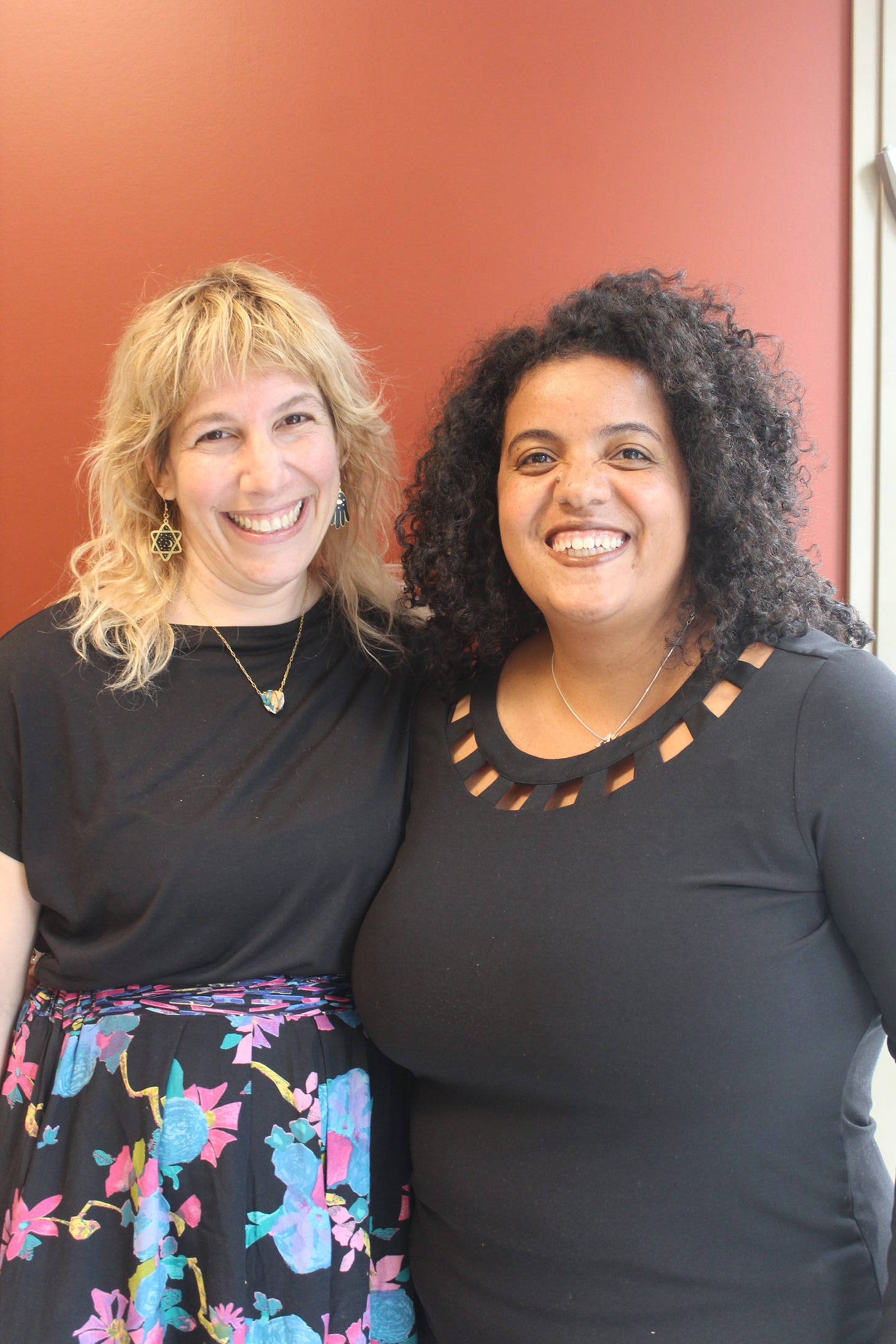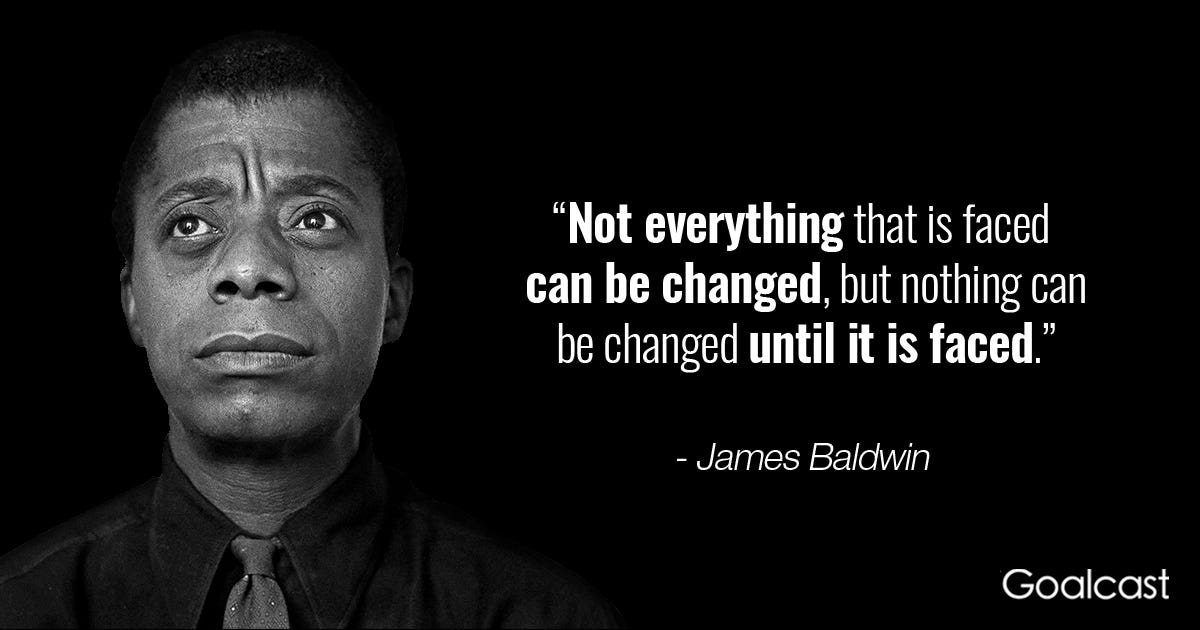How To Raise Peacemakers
Imani Romney-Rosa Chapman and Franny Silverman on racial intimacy and "getting free together."
Being back home in Louisiana, as I was earlier this month, is always an invitation to check in on my relationship with race, my own whiteness, and with difference in general.
Y’all, it was a lot. I grew up going to plantations for school field trips where they would show us the “servant’s quarters”—no lie. I attended de-facto segregated schools (East Baton Rouge Parish, where I went from kindergarten through 9th grade, was then under the longest-running desegregation order in the country, dating all the way from Brown vs. Board of Education). I experienced regular anti-Semitic bullying from evangelical Christians and even one pubescent neo-Nazi. My dad organized and campaigned to stop David Duke, an actual Grand Wizard of the Ku Klux Klan, from becoming governor in 1991.
And although I was friendly with some of the few Black children in my classes, and my parents had a few close Black friends from their literary circles, I never had a Black friend over to my house or vice versa til I got to college. Not once.
My kids are growing up in a much more diverse city, with a lot more overt talk of anti-racism, and we have a more diverse group of friends now than back then. But I still find myself with a lot of questions about raising kids who have the heart and the skills to bridge differences.
So I was really happy to be seated near Franny Silverman recently at an open circle for people to share their feelings about the Gaza war.
Franny, who is a blonde, English/Irish/Ashkenazi Jew exactly like me, works with Imani Romney-Rosa Chapman, who is Afro-Latina and Jewish, as a consultant and coach “at the intersection of racial equity, harm and repair.”
The two of them are also—and this is crucial—friends, and what Imani calls “comadres,” which is a wonderful, necessary Spanish world for the mothers whom you mother alongside.
I asked them to unpack a little of what they do and how they do it, as well as share some take-home wisdom for people who want to raise their kids right.
Q. How do you describe what you do ?
A. IMANI: Sometimes I describe it as getting free together.
Sometimes I describe it as tikkun olam [a Hebrew phrase for social action that means ‘repairing the world’]. Sometimes I describe it as wholeness /integration/ dignity. Sometimes collective movement building.
Q. Why do you work together?
IMANI: I don’t know any other way to do it. We have to learn to work together. And it’s too much on the spirit to do it alone. And particularly I, Imani choose to do this work with Franny because, as Eric Ward said when he came to our synagogue many years ago, racial intimacy is as important as anti-racist, anti-oppressive, liberatory work.
And Franny’s my comadre. This word has a very deep old revolutionary context that really can’t be translated. We’re down for each other and we’re helping to raise these kids and helping to shift the world to be ready for our kids. And I trust her to do that with me.
We’re down for each other and we’re helping to raise these kids and helping to shift the world to be ready for our kids.
And I also believe that we want each other’s highest good and whenever that’s not happening, we help each other process that from a place of love and rigor.
FRANNY: We live in a society built on freezing the individual. And the world that we’re working towards building is one that understands the strength of community. And working together in a variety of ways is both an expression of that and a pracitce of that and a modeling for others. Including our kids.
Q. Tell me about what happens at your workshops.
IMANI: We are asking people to practice skills of how to be together, learning something that is new where people have diferent perspectives, socialization, and information and experience. They are then learning somatically how to be engaged with other people across big-D or small-d difference.
We prioritize love and rigor for ourselves and other people. We are asking people to hold space for the both/and—which is very challenging. Someone else could have a totally different and equally valid experience to you.
And often we’ll quote James Baldwin on facing challenging truths.
FRANNY: We are cultivating the consciousness of not only how one thinks that they are being, but how one is being received. Which wraps with identity and power and dominant or marginalized identity—that could be racial/ethnic/gender/class identity, or rank or seniority.
Q. Franny, how do you as a Jewish and white parent raise your child in an antiracist way?
When she was little, it was actively talking to my kid about difference and similarity – it’s like triangle, circle, square. This person has peachy pink skin, this person has brown skin.
(I did a Life Kit episode on talking about race for young children that contains more of these tips.)
In white households, when we don’t talk about difference, children pick up social cues which are full of racial judgment. I was a mom talking about race all the time with my two year old— sometimes the people around me thought it was weird.
Another one of the earliest considerations I was making was around my child’s care needs: Can I be a responsible employer? What is my individual engagement with a broad institutional system of domestic workers that is impacted by class, immigration status, race?
I took her to protests. I read all the antiracist books at bedtime.
Now, at ten, she’ll come home from school and say something like, my teacher was yelling at the Black or brown kid and a white kid was doing the same thing and not getting in trouble.
Q: Imani, same question for you as an Afro-Latina and Jewish woman.
Jews are racialized, but I’m going to talk about being Black here.
Part of it is making sure she’s surrounded by affirming images and people. My mom took my daughter to see the Nutcracker in Boston and she came home with the whitest doll I’d ever seen. Immediately I remembered something that’s awesome about being Puerto Rican is that everyone looks Puerto Rican. So I said, we’re going to call her Clara (using the Spanish pronunciation).
WIlliam Cross, who developed the black racial identity development model, talks about self-concept being made up of two parts. One part is personal identity. The other part is reference group orientation– racial/group identity, race awareness, racial ideology. And all parents are navigating both parts of this.
I also want to expose my children to antiracist white people. In the culture wars, some white parents [who object to anti-racist education] are like, ‘You’re shaming my kid. They hate themselves and they hate America.’
Well, actually you have options. You could be a person who’s white and believes everyone has worth, none greater or lesser than another. Get upset at racism with us please!
That’s part of my teaching as a mother. It’s not white people, it’s whiteness.
Q. Can you both share how, as Jewish parents, you’re talking to your kids about the war in Gaza?
IMANI: Basically my whole bent is something like this: I want to talk to my kid about it before anybody else because I want to make sure that whatever she hears, she hears through my values. And I want her to make sure she feels like there’s something she can do. She took a portion of her allowance and contributed money to a family that was requesting funds.
And in the same way that I surrounded my daughter with antiracist white people in addition to people of color, she needs to understand that Jews are not alone and we do not have to fold up into ourselves. We need to continue to reach out to our community. Like Mr. Rogers said--look for the people who are helping.
And I talk to her about stereotypes: do you know that a lot of people think that all Jews have the same ideas? Do you know some people believe that Jews who live in every continent of the whole world are disloyal to their countries where they live? Isn’t that wild?
Her response is like Wow! Yeah! Wild!
When you do things like that for a lot of years, then when there’s a crisis, a heartbreaking, gutwrenching, are-we-going-to-make-it-together-as-a-Jewish-community crisis, the foundation is already there. Every brick is on top of another brick that had to be laid earlier. So the sooner we start, the better.
FRANNY: I’ve been talking to my child about Israel and Palestine for a long time. My mom’s sister moved there in the 70s; she has children and they have children. I did a lot of stuff early on through readings like the book A Child’s Garden, as a way of talking about this place our family is connected to, that our people are connected to as Jews, and that continues to have a fraught history.
After Oct. 7, I spoke directly to her about what happened. I wanted her to hear it from me first. It was hard—I was having my own emotional response for all these reasons. It wasn’t the first time she was understanding that [Israel/Palestine] is fraught, that people are making different decisions that are impacting a lot of people in a lot of horrible ways. Our family, not our household but our family, we’re not all on the same page about what to be done. And it’s really distressing and complicated and hard and terrible.
Q. And do you worry at all about burdening her with this too much, at ten years old?
It’s true I’ve been accused of being too direct. Too much of a truthteller. This world has a lot of darkness in it. It just has a lot of hurt and pain and cruelty and that has been true throughout history—and also throughout history there’s been a lot of joy and a lot of opportunity and a lot of delight and love and care and possibility.
And I am more interested in raising and growing a generation of people who can see the truth that there is the both/and of pain, sorrow, joy, delight, love, possbility than I am in pretending everything is chill all the time when it’s not and her getting hit with it later and feeling betrayed by the world.






